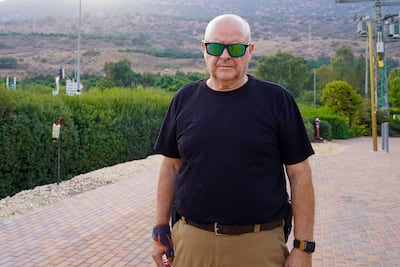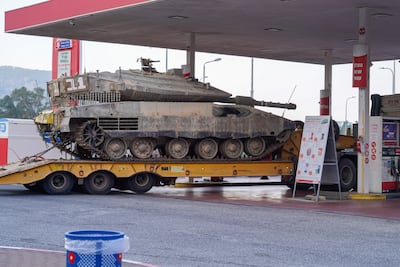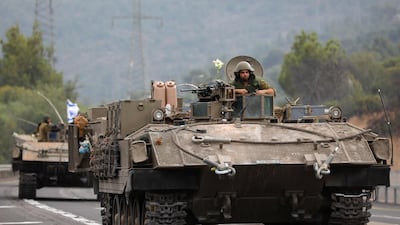Live updates: Follow the latest news on Israel-Gaza
Every night before bed, Gideon Harari unclips his pistol from his right hip and places it on his bedside table. This is not a lifelong routine for the retired military man but one he started two weeks ago following Hamas’s surprise attack on southern Israel.
Mr Harari lives in a moshav, a co-operative community similar to a kibbutz, in the far north, less than 3km from Israel’s northern border with Lebanon.
Hezbollah has long been a part of life for Israeli communities in the north but their presence, just beyond the border, has taken on added significance in recent weeks.
“People cannot bear now, because of what happened in the south, to see Hezbollah on the fence,” Mr Harari, 66, said. “You cannot live under a terror organisation that is 2km from your house.”
He leads his small community’s emergency response team.
His moshav, which usually consists of 700 people, is nearly empty as fears mount that a second front in the Israel-Gaza war could break out on the northern border with Hezbollah.

“The guys that are left in the moshav are the hardcore farmers that won't leave their farms … but for wives and children there is no reason to be here now,” Mr Harari told The National as the sound of Israeli artillery echoed in the distance.
Israel has partially evacuated 42 towns and cities along the border with Lebanon as clashes with Hezbollah have steadily intensified over the course of the last 18 days.
In the city of Kiryat Shmona, the normally bustling streets were empty save for a gaggle of soldiers and civilians, many of whom carry rifles and ammunition.
At a barber shop near the centre of town, which is the largest border city in the north, guns are strewn around.
Soldiers and civilians get hair cuts as they chat about the situation.
One local, who grew agitated after speaking with The National when he learnt the paper was based in the UAE, said while he was afraid, he would never leave the city of his birth and would defend it at all cost.
“This is my home,” the 23-year-old said, “I’m going to defend my home until I die probably.”
Omri Gigi, who runs a Moroccan food shop in Kiryat Shmona, said he sent his wife and four children to stay in a hotel an hour away in the south.
“Honestly, I'm scared,” Mr Gigi said. “And this is just the beginning.”
He said he was unsure how long he would stay in the city, which normally has a population of about 22,000 but has been reduced to a few thousand in recent days.
“The atmosphere is very, very difficult because you see nobody is here,” he said.
There is a feeling of deep uncertainty about what comes next that pervades all of Israel, but it is especially acute in the north where the tit-for-tat exchanges between the Israeli military and Hezbollah have become constant.

Armoured vehicles race down nearly deserted roads, and tanks are carried towards defensive positions along the mountainous border on the back of articulated lorries.
Mr Harari compared the military presence in the north to what it was like during the 1982 Lebanon war, when Israel invaded.
“Everyone is waiting,” said Mr Harari.
As Israel prepares for a widely anticipated ground invasion of the Gaza Strip, it has bolstered its military presence in the north and residents who have chosen to stay behind say they are ready.
“This is our place, our home. Good or bad. It doesn't matter. It's ours and we need to defend it,” Mr Harari said. “We don't have anywhere else to go.”
Hezbollah is a formidable rival, with an estimated 30,000 fighters at the ready and approximately 150,000 rockets and missiles in its arsenal, some of which can reach deep into Israel.
If another round of conflict breaks out between Israel and Hezbollah, there are fears it could drag in other countries, groups and perhaps even the US.
If the north does become a second front, Mr Harari believes the Israeli military must be decisive.
“We should finish with them for once and for all,” he said.


